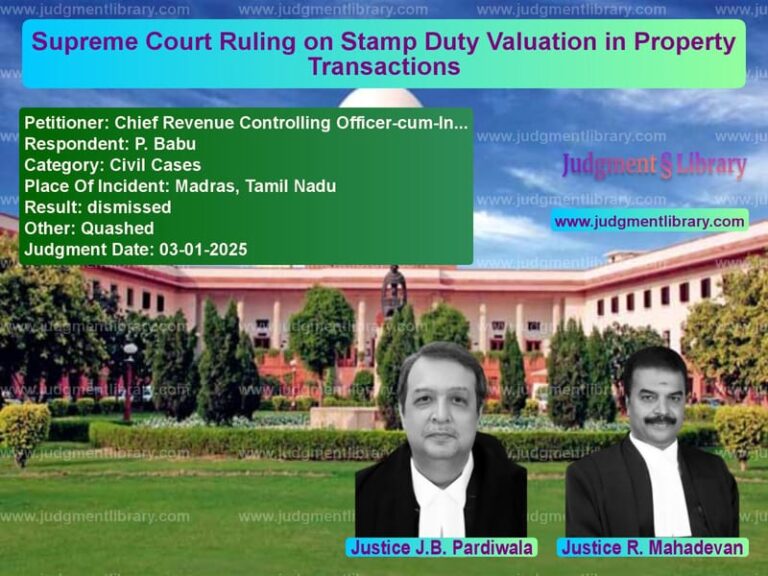Review Petition Dismissed in Manoharan Case: Death Penalty Upheld
The Supreme Court of India recently dismissed the review petition filed by Manoharan, who was convicted of the rape and murder of a 10-year-old girl and her 7-year-old brother in Coimbatore. The case, which involved brutal crimes against children, was previously upheld by the Supreme Court in a majority decision, affirming the death sentence awarded by the lower courts. The review petition challenged the conviction and sentence on multiple grounds, including alleged coercion in obtaining the confession, inadequate legal representation, and the claim that the case did not fall under the ‘rarest of rare’ doctrine warranting capital punishment.
Background of the Case
On October 29, 2010, the victims, a young girl (X) and her younger brother (Y), went missing while waiting for their school van. After an extensive search, their school bags were found floating in a canal. Investigations led to the arrest of two individuals—Mohanakrishnan and Manoharan. The prosecution alleged that the two men kidnapped the children, raped the girl, attempted to poison them, and eventually drowned them in a canal.
Legal Proceedings and Conviction
During the trial, the prosecution relied on multiple pieces of evidence, including forensic reports, eyewitness accounts, and a confession by Manoharan under Section 164 of the Criminal Procedure Code. The trial court sentenced him to death, and the Madras High Court upheld the conviction. A special leave petition to the Supreme Court was also dismissed, confirming the death penalty.
Key Arguments in the Review Petition
1. Voluntariness of the Confession
The petitioner’s counsel argued that the confession was obtained under coercion, making it inadmissible. It was contended that Manoharan was under severe psychological stress due to the in-custody death of co-accused Mohanakrishnan. Additionally, it was argued that the Magistrate who recorded the confession did not follow the mandatory safeguards under Section 164 CrPC.
2. Adequacy of Legal Representation
The defense also claimed that the petitioner had not received adequate legal representation. The trial bar initially refused to take up his case, and multiple lawyers declined representation. However, the Supreme Court found that Manoharan was provided with legal aid counsel who actively defended him, cross-examined witnesses, and ensured a fair trial.
3. Alleged Procedural Irregularities
Questions were raised about the timing of Manoharan’s arrest and the recovery of evidence. The defense argued that his arrest was recorded as occurring later than it actually did and that evidence such as the victim’s underwear, which contained Manoharan’s pubic hair, might have been tampered with. The Supreme Court rejected these claims, stating that the forensic procedures were conducted properly and the evidence remained intact.
4. Applicability of the ‘Rarest of Rare’ Doctrine
The defense contended that the case did not meet the criteria for the ‘rarest of rare’ standard, arguing that mitigating factors such as Manoharan’s young age and lack of prior criminal history should be considered. However, the Court found the crime to be particularly heinous and shocking to society, justifying the death penalty.
Supreme Court’s Decision
The Supreme Court, in a majority ruling, dismissed the review petition, affirming the death sentence. Justice Surya Kant and Justice Rohinton Fali Nariman held that the petitioner’s arguments did not meet the strict criteria required for a review under Article 137 of the Constitution. The Court reaffirmed that the case involved a meticulously planned and executed crime, displaying no signs of remorse from the petitioner.
Minority View on Sentencing
Justice Sanjiv Khanna, in his minority opinion, concurred with the conviction but dissented on the sentence, arguing that life imprisonment without remission would be a more appropriate punishment. However, since the majority upheld the death penalty, the sentence remained unchanged.
Conclusion
The dismissal of the review petition reinforces the legal principle that the ‘rarest of rare’ doctrine applies to crimes of extreme brutality, particularly against children. The case also highlights the importance of procedural safeguards in confessional statements and the role of forensic evidence in securing convictions. With this ruling, the Supreme Court has once again underscored the gravity of crimes against minors and the need for the most severe punishments in such cases.
Petitioner Name: Manoharan.Respondent Name: State by Inspector of Police, Variety Hall Police Station, Coimbatore.Judgment By: Justice Surya Kant, Justice Rohinton Fali Nariman, Justice Sanjiv Khanna.Place Of Incident: Coimbatore.Judgment Date: 07-11-2019.
Don’t miss out on the full details! Download the complete judgment in PDF format below and gain valuable insights instantly!
Download Judgment: Manoharan vs State by Inspector o Supreme Court of India Judgment Dated 07-11-2019.pdf
Direct Downlaod Judgment: Direct downlaod this Judgment
See all petitions in Murder Cases
See all petitions in Rape Cases
See all petitions in Bail and Anticipatory Bail
See all petitions in Juvenile Justice
See all petitions in Custodial Deaths and Police Misconduct
See all petitions in Judgment by Surya Kant
See all petitions in Judgment by Rohinton Fali Nariman
See all petitions in Judgment by Sanjiv Khanna
See all petitions in dismissed
See all petitions in supreme court of India judgments November 2019
See all petitions in 2019 judgments
See all posts in Criminal Cases Category
See all allowed petitions in Criminal Cases Category
See all Dismissed petitions in Criminal Cases Category
See all partially allowed petitions in Criminal Cases Category







